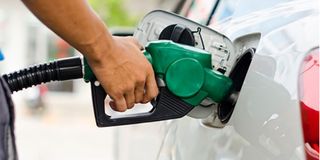Tanzania: Fuel prices decrease in line with global market trends

What you need to know:
- The prices, announced by the Energy and Water Utilities Regulatory Authority (Ewura) on Tuesday, February 6, show that in Dar es Salaam motorists will now be required to pay Sh3,051 for a litre of petrol and Sh3,029 for a litre of diesel
Dar es Salaam. Petroleum product prices in Tanzania have decreased by 1.07 percent, in line with the recent downward trend observed in the global market.
The prices, announced by the Energy and Water Utilities Regulatory Authority (Ewura) on Tuesday, February 6, show that Dar es Salaam motorists will now be required to pay Sh3,051 for a litre of petrol and Sh3,029 for a litre of diesel.
Heretofore, a litre of petrol fetched Sh3,084, while that of diesel fetched Sh3,078 in Dar es Salaam.
The Ewura director general, Dr James Mwainyekule, said in a statement on Tuesday that the price changes have been necessitated by a drop in oil prices (FOB) in the world market, with a weighted average of 10.66 percent for petrol, 11.20 percent for diesel, and 5.82 percent for kerosene.
Petroleum product prices for other cities and towns will be as follows: petrol prices in Tanga will be Sh3,064 and in Mtwara, Sh3,112, per litre, while customers in Tanga and Mtwara will pay Sh3,196 and Sh3,354, respectively, for a litre of diesel.
At the same time, the price of kerosene is Sh2,840 in Dar es Salaam, Sh2,886 in Tanga, and Sh2,913 in Mtwara.
“This decrease in prices is due to the decrease as a result of the drop in oil import costs to the Port of Dar es Salaam by an average of 9.69 percent for diesel and 1.82 percent for kerosene,” he said.
He further noted that the cost of importing petrol and diesel to the Ports of Tanga and Mtwara has also decreased by an average (weighted average) of 0.69 and 11.93 percent, respectively.
Retailers are required to sell fuel at the prices issued by Ewura. Traders of oil products are also required to sell oil at the prices set by Ewura.
"Ewura will continue to encourage competition by providing limited price information for fuel products,” he said.
According to him, oil companies are allowed to sell petroleum products at competitive prices unless the prices do not exceed the price cap in accordance with the Ewura Petroleum Products Price Setting Rules of 2022, announced on January 28, 2022, through Government Gazette No 57 and amendments to the said Regulations through Government Gazette No 761A dated October 30, 2023.
He said all fuel stations are required to publish the prices of fuel products on clearly visible posters showing fuel prices, discounts, and commercial incentives offered by the respective station.
“Where it is possible to choose, customers are advised to buy fuel products at stations that sell fuel at the cheapest price to enhance competition. It is a mistake to sell fuel without putting up price posters that are visible to customers. Severe punishment will be given to those not implementing the legal requirements per the regulations,” he said.
Further, he noted that people involved in the sale of petroleum products are required to issue sales receipts from the Electronic Fiscal Pump Printers (EFPP), and buyers must ensure that they get those payment receipts showing the name of the station, date, type of fuel purchased, and price per litre.
According to him, the receipts will be used to help oil buyers in case there are complaints of oil being sold at a price higher than the limit or oil being sold that does not have the required quality level. The receipts will also help simplify the collection of government taxes resulting from the sale of petroleum products.





